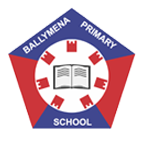Bereavement
Introduction
Ballymena Primary School is committed to the provision of a safe, happy and stimulating learning environment. It is our intention that everyone feels valued and our pupils are encouraged to develop their full potential in a caring and supportive environment.
Rationale
No matter how prepared we think we are death is often traumatic and unexpected. A considered, planned and organised response to an event is often more effective than acting on impulse.
Guidance
The DENI document - A Guide to Managing Critical Incidents in Schools provides guidance for schools in such circumstances (see Appendices 6-18) and should be referred to. The NEELB can also be contacted for support and advice.
Responsibilities
Critical Incident Team - Bereavement
Principal
Mrs Simpson – Designated Teacher
Mrs Caithness – Chair of Board of Governors
When news of a death reaches the school, a member of the Critical Incident Team –Bereavement, must be informed so that the Team can meet to make decisions on how best to progress and also to ensure appropriate safeguarding procedures. A member of the Team will contact the next of kin of the child/member of staff to discuss how the school can best deal with the child’s/member of staff’s needs.
Death of Child or a Member of Staff
The sudden death of a pupil or member of staff challenges the very heart of the school community, its identity and its coping mechanisms. By talking to the deceased’s family and being sensitive to their wishes, the Team should plan the most appropriate response to the death and the way forward for all those affected. It is important to be open and honest and to follow procedures, communicating with and reassuring all members of the school community.
Sharing grief in a supportive environment can facilitate the grieving process. However for pupils or staff particularly affected, it may be necessary to contact appropriate outside agencies.
Supporting a Pupil Dealing with the Bereavement of a Family Member
Children and young people’s understanding of death will depend on their cognitive and developmental stage. Therefore the circumstances of the death and the age and developmental stage of the pupil will determine the approach used by teachers. The Bereavement Team will advise and support staff.
Return to School
In this phase of the process, the work of the team should be re-active, sympathetic and supportive to meet the needs, feelings and emotions of both staff and pupils.
In most cases it is advisable, with the agreement of the bereaved or family of the bereaved, that everyone is aware of the situation before the pupil returns.
Teachers should endeavour to foster a compassionate yet disciplined environment. School, with its routines and rituals, often provides a respite at this traumatic time although a phased return may be appropriate
Anniversaries or birthdays often spark a revival of feelings of bereavement and it is important to be aware of such dates and to react with sensitivity and respect.
Terminally Ill Pupils/Staff
The wishes of the person and their next of kin must always be respected. Honesty about death and dying is the best line of approach.
Funerals, Memorial Services
The wishes of the bereaved family should always be taken into consideration before attending funerals or memorial services or planning a special assembly in school.
Self-Care
Teachers also require support structures when dealing with grief. If you are having difficulty dealing with your own or other’s grief, talk to a partner, friend or colleague. Staff support is also available from EA-NE Human Resources Section Tel: 028 25662416.
Bereavement & Trauma Support
Barnardos - www.barnardos.org.uk
Childhood Bereavement Network- www.childbereavement.org.uk
Childline – www.childline.org.uk
Cruse Bereavement Care – www.cruse.org.uk
Lifeline 24hr support helpline – 0808 808 8000
Samaritans – www.samaritans.org.uk
This policy will be reviewed every 2 years.
